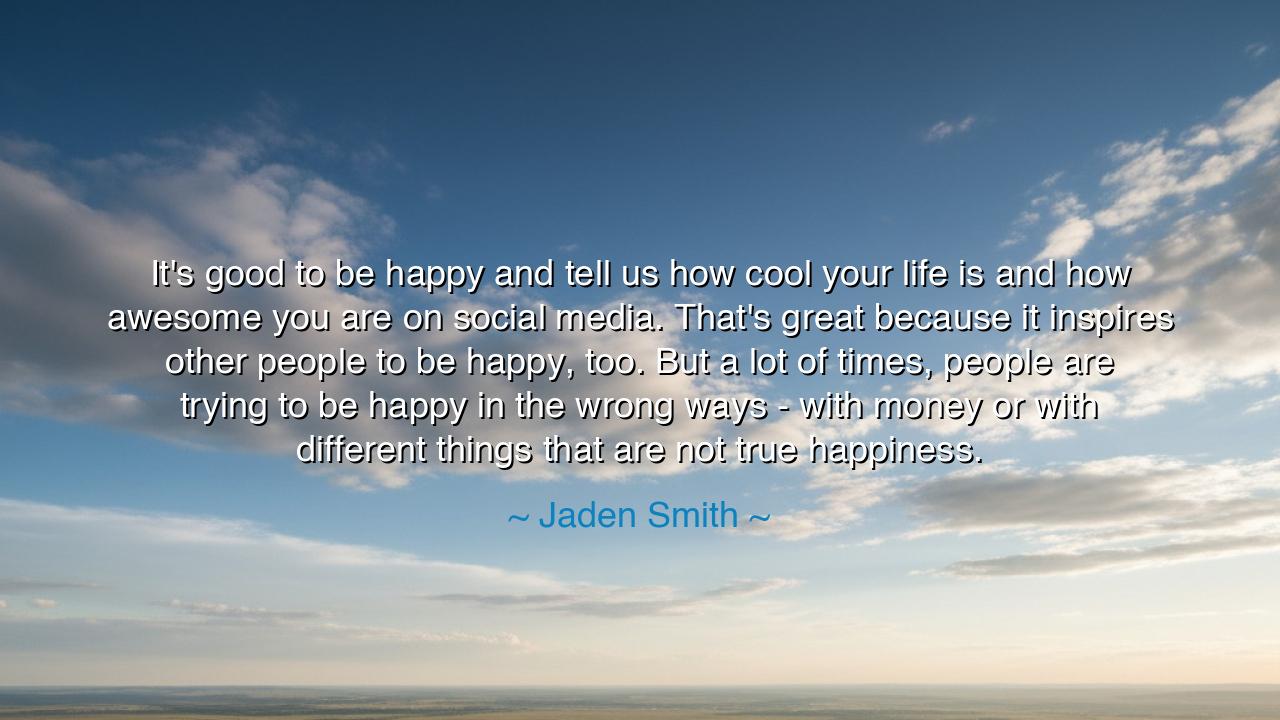
It's good to be happy and tell us how cool your life is and how
It's good to be happy and tell us how cool your life is and how awesome you are on social media. That's great because it inspires other people to be happy, too. But a lot of times, people are trying to be happy in the wrong ways - with money or with different things that are not true happiness.






In the insightful words of Jaden Smith, “It’s good to be happy and tell us how cool your life is and how awesome you are on social media. That’s great because it inspires other people to be happy, too. But a lot of times, people are trying to be happy in the wrong ways—with money or with different things that are not true happiness,” we are offered a deep reflection on the nature of happiness and how it is often mistaken for fleeting pleasures. Jaden speaks to the illusion of happiness in the modern world, where people are often consumed by the desire for material wealth or external validation, instead of seeking what is truly fulfilling—something that transcends the superficial.
This idea of true happiness versus false happiness echoes the wisdom of the ancients, particularly the philosophers of Greece. Socrates, the father of Western philosophy, famously said, "The unexamined life is not worth living." For Socrates, happiness was not something to be found in the pursuit of wealth, fame, or sensory pleasures, but rather in wisdom and virtue. The true path to happiness, according to Socrates, was through self-examination, the pursuit of truth, and the cultivation of inner peace. His thoughts parallel Jaden Smith's message, warning that the pursuit of happiness through external sources—like money—is often misguided. True joy comes not from what we acquire, but from who we become and how we live in alignment with our values.
In a similar vein, Aristotle, the great philosopher and student of Plato, defined happiness not as a fleeting emotion but as eudaimonia—a state of flourishing achieved through living a life of virtue and purpose. Aristotle argued that happiness is a byproduct of living a life that fulfills our deepest potentials, one aligned with our moral and intellectual virtues. In his view, wealth, while necessary for a comfortable life, is not the source of true happiness. Instead, it is the pursuit of excellence in our character and our relationships that brings lasting contentment. This echoes Jaden’s view, where the external markers of success—money, appearance, and popularity—are not the true indicators of a meaningful life.
The history of King Midas in Greek mythology provides a poignant illustration of this very point. Midas, blessed with the gift of turning everything he touched into gold, initially believed that his new-found wealth would bring him ultimate happiness. Yet, his greed and obsession with gold led to his downfall, as he turned even his own daughter into gold. The curse of Midas illustrates that the pursuit of happiness through material wealth often brings destruction, rather than fulfillment. The myth reflects Jaden Smith’s assertion that money and possessions are not true happiness. Midas, like many in the modern world, was blinded by the belief that external riches would provide lasting joy, only to find that they left him empty and sorrowful.
Similarly, in the life of Gandhi, we see an example of someone who found true happiness not in the acquisition of material wealth but in the pursuit of truth and selflessness. Gandhi lived a life of simplicity, eschewing the comforts and luxuries of the world in favor of living in alignment with his principles. His happiness was rooted in his ability to serve others, to embrace humility, and to pursue justice. Gandhi’s path shows that true happiness comes not from the outward accumulation of wealth, but from the inner peace that comes with integrity and purpose.
The lesson embedded in Jaden Smith’s words, and echoed by the ancients, is a powerful reminder: true happiness cannot be bought or attained through external sources. It is a state of being that arises from living in alignment with one’s values, virtues, and purpose. As Socrates taught, we must examine our lives and seek wisdom, not just in knowledge, but in how we live and treat others. Jaden’s message is a call to question the societal obsession with materialism and external validation, and to turn inward, where the real treasures of happiness lie—self-awareness, compassion, and service to the greater good.
In practical terms, we must shift our focus away from the fleeting joys that money and status provide, and instead, turn toward what truly nourishes the soul: personal growth, meaningful relationships, and a life of integrity. We can find happiness not by chasing external accomplishments, but by cultivating our inner lives—by learning, growing, and giving. Whether through self-reflection, creative pursuits, or helping others, we can learn to embrace the deeper truths of happiness that the ancients taught us, and live in a way that brings lasting joy. Just as Aristotle and Gandhi found fulfillment in virtuous living, so too can we find peace and happiness when we align our lives with the values that truly matter.






AAdministratorAdministrator
Welcome, honored guests. Please leave a comment, we will respond soon